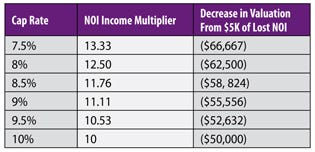The Impact of Self-Storage Auctions: Improving Operating Income, Increasing Facility Value
The recent popularity of reality TV shows such as Storage Wars and Auction Hunters has given self-storage operators a new tool to improve their NOIcapturing lost revenue from non-paying tenants.
April 20, 2011

By Chris Hitler
There are many ways to enhance your self-storage facilitys net operating income (NOI), including raising prices or lowering expenses. However, the recent popularity of reality TV shows such as Storage Wars and Auction Hunters has given self-storage operators a new tool to improve their NOIcapturing lost revenue from non-paying tenants.
Calculating NOI
Historically, the most important outcome of the lien sale was to have the unit emptied so it could be rented to a new customer. Most operators recognize auctions likely wont generate much cash. Fortunately, these reality shows have changed the game for storage operators by creating a wave of treasure-seekers looking for bargains.
In the past, a 10-by-20 unit full of boxes, clothes, furniture and other personal items may have netted $10 to $50 at auction. Today, an operator can expect anywhere from $200 to $1,000 or more for that same unit. Better auctions are not only important because more cash ends up in your pocket, but they also increase your NOI, which is the most critical valuation factor when it comes time to sell your property.
Before exploring how you can tap into this trend and get more buyers to your auctions, lets review the impact of successful lien sales on property valuation. NOI is the basis for roughly 70 percent to 99 percent of a propertys value. Most buyers appraise properties based on a multiple of NOI, and then make some adjustments, such as a deferred-maintenance allowance. Valuation multiples generally range from 10 to 13 times NOI, so every dollar improvement has a $10 to $13 dollar impact on a propertys value.
Lets look at an example. Assume an operator has five to 10 delinquent tenants who shouldve paid $5,000 in rent and other fees. Lets also assume the operator never gets any bidders at his auctions, forcing him to give the stuff away to the local junk guy. The accompanying chart illustrates the valuation impact of failing to realize that rental income.

Even if this propertys value has a relatively low multiple of 10 percent (i.e., high cap rate), the operator is still missing out on $50,000 in value when it comes time to sell. The impact is even higher if the property justifies a lower cap rate.
Get the Word Out
So now that you understand the valuation impact of better lien-sale performance, lets explore concrete steps you can take to have more success at your auctions. Just like any product or service, people will only buyor, in the case of auctions, attendif they know about it. Simply relying on your public notice to reach potential auction buyers is not nearly enough. You have to market these events.
Some operators like to post signs on their local community boards and around their facility. Serious auction buyers are willing to travel great distancesthree or more hoursfor sales. Consequently, they probably wont read the local newspaper or see the signs where you posted your public notice.
Another tactic is to capture e-mail addresses of buyers who attend your auctions, then notify them of your sales. Unfortunately, this approach only markets to current buyers and doesnt help you attract new ones.
One more option is to hire an auctioneer. Good auctioneers have a database of buyers they invite to their auctions. But accessing their network of buyers does come with a price. Auctioneers can charge anywhere from 20 percent to 40 percent of the revenue generated.
The most cost-effective tactic is to list your sale on an auction website. There are several quality resources on the Web. Posting your auction can help you increase buyer attendance upward of four times, with bids increasing as high as 10 times.
Tips for Better Auctions
Drawing people to your event isnt the only essential element to a successful auction. Here are a few other tips to ensure increased revenue.
The bigger the sale the better. If possible, run one large auction vs. a few small ones. Buyers are willing to travel farther for sales with more units because theres a higher probability of purchase.
Reference the auction. Include a reference to the auction website in your public notice. This gives you a mechanism to notify the public if the sale gets canceled and reduces your reliance on the newspaper to notify buyers of future sales.
Treat the process and buyers respectively. Buyers talk to each other. Many are professionals and know the owners who stage units to make them seem better than they actually are. If buyers sense the facility owner is gaming the process, theyll tell others, and your attendance will suffer in the long run.
Ultimately, the auction process is a tool of last resort. Owners should try to collect rent rather than host auctions. However, if your delinquent tenants leave you no choice but to conduct a lien sale, you might as well be successful and get as many buyers as possible to attend. Not only will it put more money back in your pocket, it will give you a better valuation when its time to sell your property.
Chris Hitler is an experienced self-storage owner and broker for the Argus Self Storage Sales Network. He launched RummageMarketplace.com with the aim to help the self-storage industry attract more buyers to lien-sale auctions. To reach him, call 312.404.7933.
You May Also Like





